TODAY’S READING IN THE OLD TESTAMENT- Genesis 5:1-7:24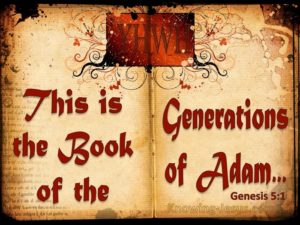
We notice that God created man, He made him in the likeness of God. He created them male and female, and He blessed them and named them ‘Man’ (literally, ‘Adam’) in the day they were created (Genesis 5:1).
We discover that after the fall, the woman is named, ‘Eve’ the mother of all living (Genesis 3:20). Prior to the fall, the first couple shared the same name and purpose, and centered their life in the fellowship of their Maker. After the Fall, that oneness shattered.
Genesis 5:3 3 When Adam had lived one hundred and thirty years, he became the father of a son in his own likeness, according to his image, and named him Seth. 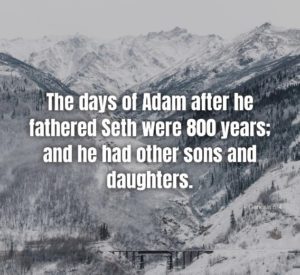
Adam’s children were born in the likeness of fallen man. Yesterday we read the sad story of Cain and Abel. Today we see that God appoints a Substitute for the hereditary line of Abel. It will be through the line of ‘Seth’ that the Messiah will come forth.
Genesis 5 lists the human genealogy from Adam with the length of years lived and the fact of their death. In this chapter we see the repeated phrase— “and he died.”
Here we have God’s judgment upon sin: “The wages of sin is death” (Romans 6:23a).
Some have pointed out that the meaning of the names listed in this genealogy when put together give us the hope of the gospel in a sentence: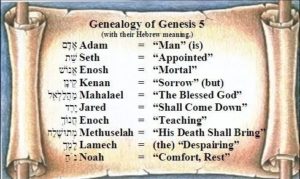
Man (Adam)
is appointed (Seth)
mortal (Enoch)
sorrow (Cainan) but
the blessed God (Mahalaleel)
shall come down (Jared)
teaching (Enoch) that
His death shall bring (Methuselah)
the despairing (Lamech)
rest (Noah)
Matthew 11:28 (NIV) 28 “Come to me, all you who are weary and burdened, and I will give you rest.
In GENESIS 6 we are introduced to Noah.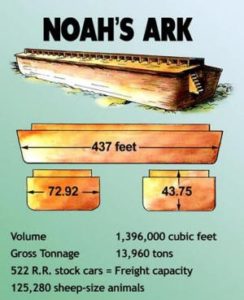
Mankind in going astray is ‘flesh’ (Gen 6:3). The use of the word ‘flesh’ in this instance is similar to the way that the Apostle Paul uses it to describe ‘the fallen nature of man’. ‘Flesh’ refers to the inward bent of mankind’s inherited corrupt disposition. The sin nature has an intrinsic bias towards ‘selfishness’. It expresses rebellion and indifference towards God and a demonstrable independence from Him.
“All of us like sheep have gone astray, each of us has turned to his own way; (Isaiah 53:6a)
There is widespread corruption on the earth.
“The LORD saw how great man’s wickedness on the earth had become, and that every inclination of the thoughts of his heart was only evil all the time.” (Gen 6:5)
Jesus certainly believed that Genesis 6 was historically accurate:
26 “And just as it happened in the days of Noah, so it will be also in the days of the Son of Man: 27 they were eating, they were drinking, they were marrying, they were being given in marriage, until the day that Noah entered the ark, and the flood came and destroyed them all. (Luke 17:26-27).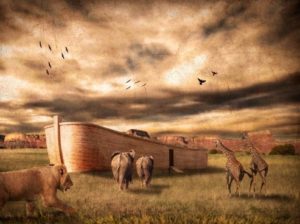
The ark of Noah is a picture of God’s plan of salvation in Christ. Noah was saved because he believed God’s message (Hebrews 11:7).
The ark, like the plan of salvation in the Christ event- (the incarnation, sinless living and substitutionary dying of Jesus to fulfill the law), is planned by God. Noah had no part in the planning. God ordained that the ark would be the means of salvation from His righteous wrathful judgment against sin. God was judging the old creation with the flood. Those who entered the ark (plan of salvation) would be saved from God’s wrath.
They were saved, not because of their own goodness, but because of God’s merciful design to provide a Savior, the ark of salvation, for those who believe.
As with the story of man’s fall in Genesis 3, no sooner had God announced His judgment against sin, He also announced His provision of escape from judgment. In every case, that provision speaks of Jesus!
14 So make yourself an ark of cypress wood; make rooms in it and coat it with pitch inside and out. (Genesis 6:14)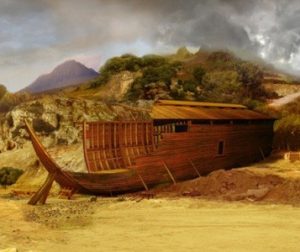
The ark is made of wood. Wood speaks of humanity. Cypress wood is known for its resistance to corruption. The wood represents the sinless incorruptible humanity of Jesus that qualifies Him to be our Savior. The wood is covered with pitch. The Hebrew word for ‘pitch’ is ‘kopher’ – covering. The common Hebrew word ‘kopher’ relates to atonement or ransom. We learn as we read the Bible, the blood would provide atonement for our souls. The blood represents life (Lev. 17:11). The life of a sinless substitute for sinners would be offered on the altar of Calvary’s cross to provide a perfect atonement for mankind’s sin.
There are three sections to the ark, just as there are three sections to the tabernacle (another picture of the plan of salvation in the Old Testament!).
So we can see that the ark is a type, a representation, a place holder, for Jesus, our Lord and Savior. Jesus is the Greater Ark of Noah. God’s plan of salvation is found in Him.
There are many wonderful parallels to the plan of salvation seen in the ark of Noah. It is the plan of salvation that we can enter into through faith in Christ.
NEW TESTAMENT READING: MATTHEW 3:7-4:11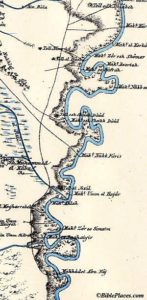
Jesus comes to John the Baptist to be baptized. At first John refuses, as he has been preaching a baptism of repentance, and Jesus was without sin, the spotless Lamb of God, and therefore no repentance was required of him. John recognized immediately that it was he, John, who was the sinner who needed to be baptized by Jesus, and not Jesus by him.
The River Jordan is a type of the life of the natural man. Although its source is in the highest heights of Mt. Hermon, it follows a circuitous 200-mile course as if it is trying to avoid its end which is the Dead Sea!
Death is the natural end of man. Jesus was willing to identify with that fact and became man. As the ‘God man’ He was ‘obedient unto death, even death on the cross’. He became the sacrificial Lamb of God who takes away the sin of the world (John 1:29).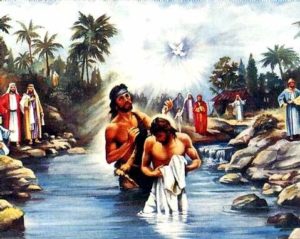
Jesus’ baptism speaks of His voluntary plunge into identification with man. In the Incarnation He, the Eternal Son of God, becomes man, as He as God made man to be- without sin and fully alive to God the Father through the Holy Spirit. All that He does now, He does on our behalf. He fulfills the righteous requirements of the Law through His perfect obedience to God. All that He does, He does as our Representative. He is led by the Spirit to rewrite our history in the first Adam. Where Adam did wrong, He would do right. Like the first Adam, He was put in a position of being tempted by Satan. Where the first man gave way to temptation, Jesus resisted temptation through full devotion to His Father’s will revealed through the Word.
Where the first Adam failed through disobedience, Jesus as the Last Adam succeeded. He would be obedient unto death, even the death of the cross.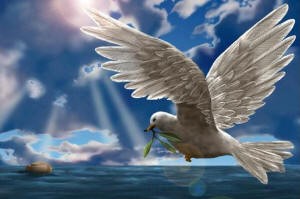
When Jesus emerges from the Jordan, He becomes the resting place for the Holy Spirit who descends upon Him in the form of the dove. It is noteworthy that according to the Scriptural record of Noah’s flood, a dove, the bird that brought Noah the promise of a new beginning and a new life, is not pictured again until this moment. The dove found no resting place since the ‘old creation’ (in Adam) was judged. Jesus is the Promised Land, upon which the dove can rest. Jesus is the second man, the federal head of the New Creation. Our history as a new creation is being written in Him!
God’s plan of salvation is found in Jesus. Jesus is our ark! (1 Peter 3:18-22) Having heard and believed the message of truth (Eph 1:13) we are baptized into Christ (Romans 6:3) and brought into newness of life!
2 Corinthians 5:17 17 Therefore, if anyone is in Christ, he is a new creation; old things have passed away; behold, all things have become new.
READING FROM THE BOOK OF PSALMS- PSALM 3:1-8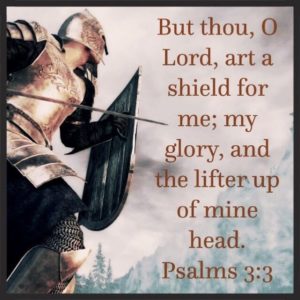
Psalm 3- Jesus is a shield about us, our glory and the lifter of our head! He is our sustainer; the one who answers our prayers. He is the author and finisher of our salvation!
Psalm 3 contains the first reference in the Book of Psalms to actually being ‘a psalm’, and more specifically, a psalm of David. It contains a prayer attributed to the time when he fled from his betraying son, Absalom, who was usurping his authority and leading a rebellion against him.
We can learn how to commit our difficult situations to the Lord from David’s example.
Is your confidence in the Lord? He is the One who brings your salvation.
READING FROM THE BOOK OF PROVERBS- PROVERBS 1:10-19
This portion from Proverbs 1 shows the importance of resisting peer-pressure to abandon our disposition of trust and obedience in relationship to the Lord.
Proverbs 1:10-19 (NASB) 10 My son, if sinners entice you, do not consent. 11 If they say, “Come with us, let us lie in wait for blood, Let us ambush the innocent without cause; 12 Let us swallow them alive like Sheol, Even whole, as those who go down to the pit; 13 We will find all kinds of precious wealth, We will fill our houses with spoil; 14 Throw in your lot with us, We shall all have one purse,” 15 My son, do not walk in the way with them. Keep your feet from their path, 16 For their feet run to evil and they hasten to shed blood. 17 Indeed, it is useless to spread the baited net in the sight of any bird; 18 But they lie in wait for their own blood; They ambush their own lives. 19 So are the ways of everyone who gains by violence; It takes away the life of its possessors.
PRAYER: Lord God, You are the Maker of heaven and earth. You are also our Merciful Savior. We thank You for Your plan of salvation revealed in Your Word. You made Jesus to be ‘our Seth”, ‘our appointed Substitute’ our ‘ark of refuge’ delivering us from the wrath to come! Though temptations and enemies may surround me, You are my shield, the glory and the lifter of My head. You answer My prayer on the merits of Christ’s perfect work on my behalf. Teach me to say ‘no’ to ungodliness and walk in the ways of righteousness. In Jesus’ Name. Amen
Yours in the grip of God’s grace,
Pastor David
